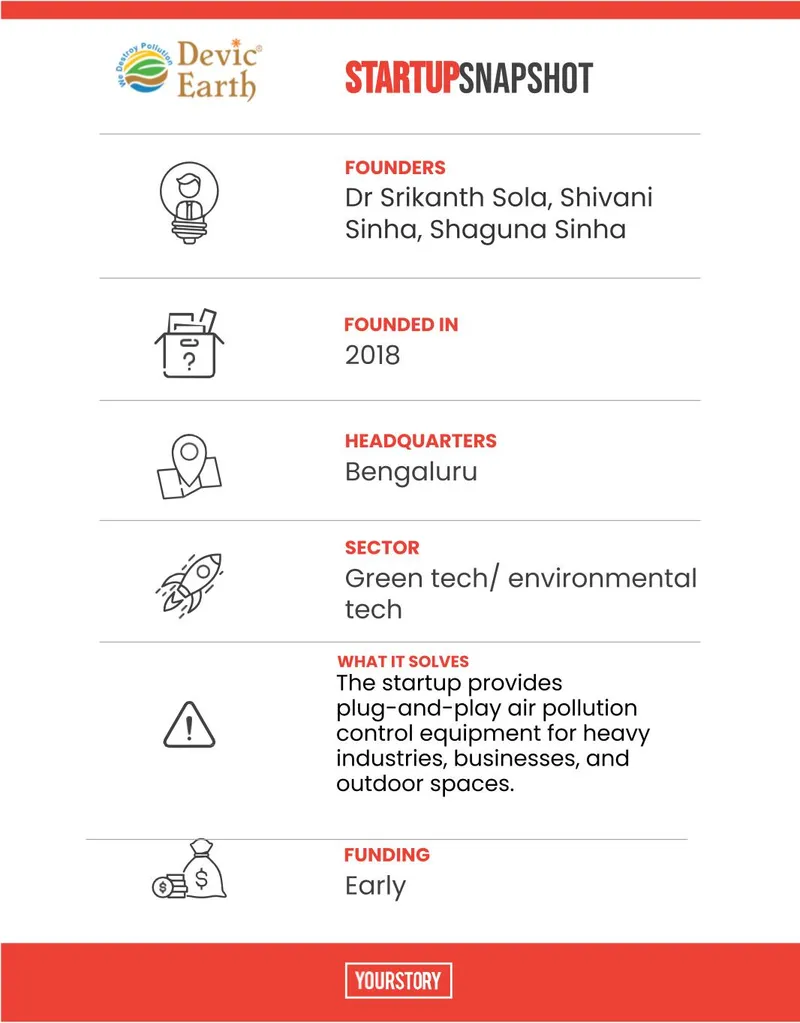[Tech50] How green tech startup Devic Earth is enabling heavy industries control air pollution
Here’s how environmental tech company Devic Earth, one of YourStory’s Tech50 2021 startups, is enabling heavy industries achieve their air pollution control targets and helping companies invest in healthier and happier employees
When cardiologist Dr Srikanth Sola moved back to India from the US in 2008, he saw first hand the impact of air pollution on human lives beyond statistics. An alumna of Stanford University, who has worked both in the US (Cleveland Clinic) as well as in India (Sri Sathya Sai Institute of Higher Medical Sciences), Dr Srikanth takes us through his journey that in 2018 eventually culminated into the launch of the green tech startup, Devic Earth, which is also one among YourStory’s Tech50 2021 startups.
“I was a highly accomplished cardiologist in the United States and I came back to India because I wanted to serve the poor,” shares Dr Srikanth.
Dr Srikanth Sola is Co-founder, Director and CEO, Shivani Sinha is Co-founder and Shaguna Sinha is Co-Founder and CFO of .
According to the World Health Organisation (WHO), air pollution kills seven million people per year. Leveraging his strong biomedical engineering background in the US, Dr Srikanth was able to put together a team of scientists and engineers and over a period of 10 years, the team developed a technology that would improve air quality. The motto was to offer a technological intervention that would be safe and effective, and cover large areas at a low cost.
“As a cardiologist, I have looked into the hearts of thousands of patients, but when I actually looked into my own inner heart, I thought that while it’s great that I get to save lives, this technology could actually save millions of lives. And our venture Devic Earth was started upon this foundation,” shares Dr Srikanth.
Devic Earth provides plug-and-play air pollution control equipment for heavy industries, factories, businesses, and outdoor spaces.
Devic Earth’s flagship product, Pure Skies, works on Pulsed WiFi technology and covers large areas — both indoors and outdoors — with cost-effective efficiency. Rapid pulses originate from the device in the Wi-Fi frequency band, creating a temporary charge on microscopic pollutant particles (PM2.5 and PM10) present in the air. Due to the increased charge, the natural process of agglomeration and settling of pollutant particles (known as dry deposition) is accelerated. Air quality index typically improves by 50-90 percent outdoors. Pure Skies is backed by 13 years of research and development (R&D), and is third party certified for efficacy and safety.
Healthy and happy customers
Customer feedback at Devic Earth ranges from healthier employees who apply for lesser sick leaves, to happier customers. All of these account for cost-saving measures on the company’s part depending on the company size. “So, it’s a direct health as well as a financial impact, the direct benefits of breathing clean air. You can’t buy happiness but when the air is cleaner, we are genuinely happy and that accounts for employee satisfaction,” explains Dr Srikanth.

Heavy lifting for the heavy industries
The USP of Devic Earth is that they are able to cover large areas. “When we started, we were very broad in our approach, owing to the fact that everyone is affected by air pollution, but we soon realised we needed to focus our efforts. We learnt that we needed to take our technology to the people who are worst affected, who have the greatest need for this technology. So this year, during the second wave of the pandemic, we focussed on the heavy industries — steel, cement, mines, thermo power plants. This has helped us increase our conversion rate threefold leading to higher profits," he adds.
But why heavy industries?
“Owing to the increased emphasis on the United Nations (UN) Sustainable Development Goals (SDGs), every company in today’s time has to prove their eco-friendly credentials in operations and practices. Failing to do so would adversely affect their business and that’s where the product by Devic Earth fits in,” shares Dr Srikanth.
The company is also focussing on business-to-government (B2G), and they have already engineered a number of efficient pilot projects in collaboration with government outfits or as part of commercial discussions.
The promotional strategy is geared towards business-to-business (B2B), which means the environmental tech startup mines a lot of traditional digital mediums like social media, websites, Google and online advertising. However, very soon, the startup realised that a lot of their customers being located in interior or remote areas might not enjoy good-quality or uninterrupted internet access. Hence, their promotional strategy is actually a mix outreach programme across webinars as well as in-house sales team initiatives.
From air pollution to virus tracking
"The product line or technology was studied at the Indian Institute of Technology (IIT) Kanpur, where the lab studies indicated that not only can we reduce pollution, we can also reduce particles as small as viruses. We went on to test our technology at an Indian Council of Medical Research (ICMR) approved laboratory where it was ascertained that we would be able to reduce airborne COVID by 60 percent. So, we would be launching a COVID-specific medical device as part of our future plan," shares Dr Srikanth.
Dr Srikanth feels that working in India has been a real blessing for the company. “We have got a huge talent pool of great people. Secondly, we can develop our product at a much lower cost than in the United States or Europe,” he adds.
“Devic means bhoomi devi — Mother Earth, so that’s how we got the name. We are proud that this world-class global technology is made in India and developed from scratch here,” emphasises Dr Srikanth.
Edited by Anju Narayanan


![[Tech50] How green tech startup Devic Earth is enabling heavy industries control air pollution](https://images.yourstory.com/cs/2/0e302530227f11ec9e19b7c38d296967/Devicearthfeature-1641284220710.jpg?mode=crop&crop=faces&ar=2%3A1&format=auto&w=1920&q=75)
![[Tech50] How this foodtech startup is committed to delivering mindful consumption with guilt-free, plant-based meats](https://images.yourstory.com/cs/2/721b1c100eb911eb936a1114ea00a5c0/NewBrandingCopyEditorialTeamMaster7-1641181357727.jpg?fm=png&auto=format&h=100&w=100&crop=entropy&fit=crop)




